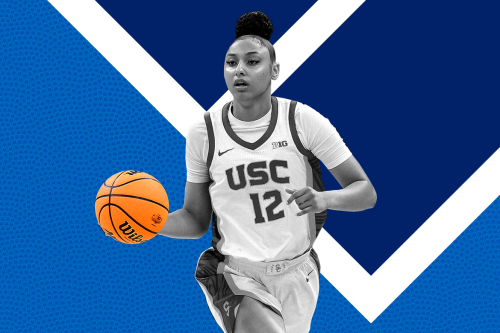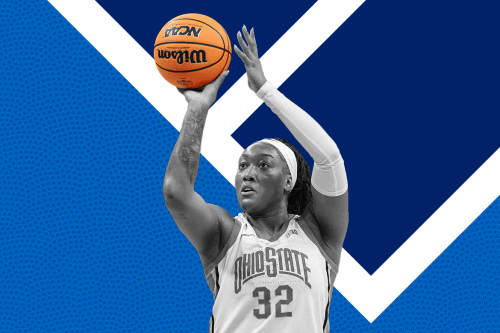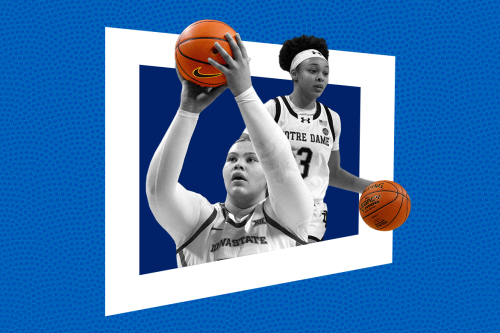The Role Mental Toughness Plays (or, Rather, Doesn’t) In a Champion Mindset, According to a Sports Psychologist
Here's why a sports psychologist says the emphasis of mental toughness in sports needs to be de-prioritized in favor of mental health.

The concept of mental toughness has long been lauded as a component of optimal performance in sports. Tough athletes swallow struggles and numb discomfort (and win trophies or medals as compensation for their sacrifices), and they’re celebrated for doing so by sports organizations, the media, the occasional pushy parent, championship-hungry coaches, and potentially themselves. But according to research, this psychological fortitude often comes at the cost of mental health, which means, among other effects, it’s not something we should be celebrating.
Experts in This Article
executive board member for the Association of Applied Sports Psychology and an expert on inclusive and equity-focused practice in sport and health
“Mental toughness denotes that those who perform well—or belong in sport—embody some degree of toughness, yet toughness is a narrow and monolithic concept that doesn’t permit athletes’ diverse identities and experiences to exist fully,” says Leeja Carter, PhD, executive board member for the Association of Applied Sports Psychology. Prioritizing mental toughness above all else can lead to ignoring the onset of an injury or remaining quiet while shouldering mental-health challenges, both of which can have catastrophic results. On the flip side, “dispelling ‘toughness’ as an ideal aspect to peak performance is crucial to creating a more adaptive and flexible idea of mental health in sport,” Dr. Carter adds.
“Toughness is a narrow and monolithic concept that doesn’t permit athletes’ diverse identities and experiences to exist fully.” —Leeja Carter, PhD, sports psychologist
A performance-only priority for an athlete—and their subsequent identity—can tip the scales to only value wins no matter the risk, enabling mental health issues to fester and thrive in the background. In fact, according to a 2015 study in Current Sports Medicine, the prevalence of depression among college athletes in the United States was between double and triple the amount of the general population. While the research doesn’t go so far as to name the pressure put on athletes to win and optimize, at any cost, as a reason, the correlation is certainly compelling.
Gold Medal Couple Tara Davis-Woodhall and Hunter Woodhall Talk Marriage, Motivation, and Their Next Chapter With Nike

Coach Kara Lawson Wants You to ‘Handle Hard Better’—and Here Are 3 Ways to Do Just That

JuJu Watkins Leaves March Madness With ACL Tear—and This Knee Injury Is More Common Than You Think

And, perhaps the emphasis is already changing. The tie binding mental and physical health is a truth that gymnast Simone Biles pointed out in an Instagram Story following her withdrawal from the team finals and individual all-around competition in the 2020 Olympics. Along with Biles, elite athletes including tennis player Naomi Osaka and swimmer Jacob Pebleysitting out top competitions to prioritize their mental health has been helping to shift the long-accepted conflation of mental toughness and a champion mindset.
This intel isn’t exactly new, either. A 2004 study published in Behavior Therapy, concluded that contrary to long-accepted belief that “negative thoughts and emotions must be controlled, eliminated, or replaced for athlete-clients to perform optimally…efforts to control, eliminate, or suppress these internal states may actually have the opposite effect.” Basically, the more mental health challenges are neglected, the more pronounced, severe, and potentially damaging they become.
So, what should replace the emphasis on toughness? “Goals, flexibility, adaptability, and a positive mindset,” says Dr. Carter. These are fundamental components of an optimal mindset for any person pursuing a fitness goal, and they’re intricately linked.
“Goals are important,” Dr. Carter says, “But keeping those goals and mindset flexible is also vital. Remaining flexible and adaptable to unforeseen yet likely adversity allows exercisers to see their fitness journey as not fixed but including a variety of circumstances. Remaining flexible will enable you to regroup and problem solve when things may not go as planned.” The crucial final ingredient? A positive mindset or mantra, she says, which can motivate an athlete during the competition or tough training sessions.
Furthermore, the 2004 study suggests that athletes can up performance by developing mindfulness techniques and practices that can foster in-the-moment responses and non-judgmental acceptance of what they’re going through. These skills can be applied to just about any training or game-day scenario whether that be negative self-talk, inescapable weather conditions, or maintaining a clear mind to best respond to a coach’s recommendation.
Maintaining optimal mental health requires that the athlete remains open with themselves, honest about what they are feeling, and to possess self-compassion to be vulnerable no matter the stakes at play. It may sound like the opposite of mental toughness, but it’s paramount for fostering improvement for athletes of all stripes. “Any decision that places one’s personal safety, health, and care first is a positive decision and should be lauded,” says Dr. Carter. And that goes for athletes of any level.
Oh hi! You look like someone who loves free workouts, discounts for cutting-edge wellness brands, and exclusive Well+Good content. Sign up for Well+, our online community of wellness insiders, and unlock your rewards instantly.
Sign Up for Our Daily Newsletter
Get all the latest in wellness, trends, food, fitness, beauty, and more delivered right to your inbox.
Got it, you've been added to our email list.







